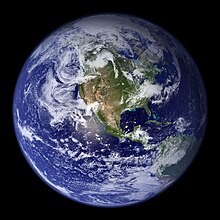Study suggests oldest rocks are from Quebec
Saturday, September 27, 2008

Image: NASA.
Radiometric dating of the schists of Nuvvuagittuq greenstone belt in northern Quebec, Canada have indicated an age of 4280 million years. This is the oldest date obtained for any rock on earth. The study, reported in the latest issue of Science, was carried out by scientists of McGill University, Montreal, Carnegie Institution of Washington and Université du Québec, Montreal.
The study relying on samarium-neodymium isotopic data place the age of rocks 250 million years older that the previously dated Acasta gneiss. The Acasta gneiss in Canada's Northwest Territories is dated at 4030 million years. Previous studies on the mineral ages of zircon found in younger rocks from Western Australia have indicated 4360 million years. If correct, the new data will give more information on the formation of the earliest crust of earth in the Hadean era, about 300 million years after the formation of Earth itself.
The age data of the oldest rocks named "faux amphibolite" indicate a range from 3800 - 4280 million years. The scientists favor 4280 million years as the age of the rock, that was later metamorphosed to another rock 3800 million years ago. The original rocks may represent part of an ancient ocean floor.
The scientists also speculate that a banded iron formation associated with the rocks may indicate presence of the earliest life on earth. The bacterial origin of this formation is yet to be established.
Stephen J. Mojzsis, a professor of geological sciences at the University of Colorado suggest that the rocks may be actually younger, with some remnants of 4280 million year rocks included in it. "I hope that I'm wrong," Dr. Mojzsis said. "If that happens, I believe there will be a land rush by geologists to northern Quebec."
Sources
- James Morgan. "Team finds Earth's 'oldest rocks'" — BBC News Online, September 26, 2008
- David Biello. "Rock of (old) ages surfaces in Canada" — Scientific American, September 26, 2008
- Kenneth Chang. "Rocks May Be Oldest on Earth, Scientists Say" — The New York Times, September 26, 2008
References
- Jonathan O'Neil, Richard W. Carlson, Don Francis, Ross K. Stevenson. "Neodymium-142 Evidence for Hadean Mafic Crust" — Science, September 26, 2008

